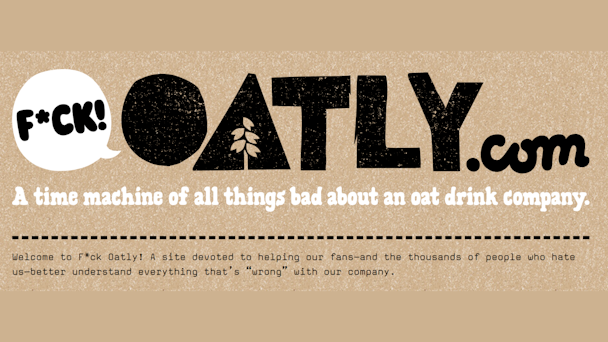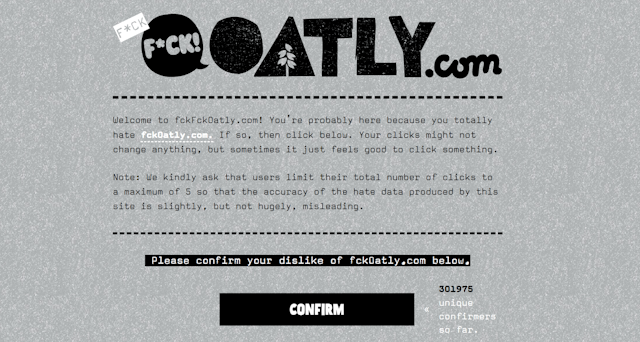Why hater-debunking FckOatly.com is more than a PR play
The alternative milk brand’s owned and operated hate blog FckOatly.com has seen 300,000 visits in seven months.

FckOatly.com / Oatly
Oatly has seen its fair share of controversies, lawsuits, and ad bans. In October 2022, it debunked some of those in a salty blog that has since mustered more visitors than most metaverse activations. The addressed scandals vary; from its lawsuit with the makers of PureOaty, to ageism accusations; and who can forget the claims it was selling oat residue to a pig farm.
‘Haters’ searching these stories are likely to land on a series of blogs asking them if they ‘Totally hate FckOatly.com?’. The tongue-in-cheek set-up then asks them to click to confirm their dislike of FckOatly.com. There is a further five manifestations of the site ending with https://fckfckfckfckfckoatly.com.
Advertisement
Oatly executive creative director Martin Ringqvist and Brendan P. Lewis, executive vice-president of global communications and public affairs, said FckOatly proves what the brand stands for. And it’s something, they say, competitors could only dream of doing.
“There isn’t an AI-generated bot behind anything that we put out, there isn't massively washed over corporate speak it is about being very authentic and very real,” Lewis claimed.
Cribbed from FckOatly.com: “Why would we build such a website? That’s a great question! For starters, it’s super convenient to have the latest boycotts and criticisms all in one place. But more importantly, we’re not the type of company to hide from moments like these. We see all the negative headlines, posts and petitions as an inevitable consequence of trying to create positive societal change.”
The anti-Oatly site is reminiscent of stunts by the likes of Carlsberg, which published negative tweets about its beer, one likening Carlsberg to ‘rancid piss of Satan’. And KFC ran out-of-home ads with harsh consumer feedback about the taste of its fries.
Advertisement
The slight tweak in Oatly’s case is that not all controversies and criticisms will end up on the site. The company is only publishing the negative reactions to decisions Oatly still firmly stands for. “We are on a mission here and it’s clearer on the site why we took those decisions back in the day, and that we still stand up for them,” Ringqvist says. On some issues, Ringqvist says Oatly will simply apologize for and admit it was wrong.

But weirdly, Lewis denies the site is a PR play claiming the company has only started talking about it seven months after launch when traffic to the site skyrocketed from 700 visits to more than 300,000.
“A normal company would say, well, ‘we’ve set up this website that talks about some issues, and we just want to be very transparent about it’, but we just threw it out there and wanted people to discover it on their own,” he says.
Suggested newsletters for you
Lewis claims there is an added benefit for Oatly’s PR team and that’s to direct questions about any controversy to the site. “We’ve said everything we need to say about certain things so why not put it all in one spot,” Lewis explains. “We are focused on driving our business forward and this is another manifestation for us.”
The site is part of Oatly’s “consistently inconsistent” strategy which attempts to break the traditional rules of marketing. This could be anything from using OOH advertising to promote a free e-newsletter www.oatly.com/spam, writing long captions on Instagram and creating the Reddit thread ‘how to do e-newsletters’.
Lewis tells The Drum the Oatly brand gives its staff “permission” to act in a certain way. But behind every stunt, Lewis says, is a “door to a larger conversation”.
Meanwhile, Martin says that from a brand perspective, this strategy is a way to stay “interesting and relevant.” He admits it’s easy to fall into a trap as an established company to create a “brand book” and stick to the script. “We try to challenge ourselves as well as we challenge you know, the whole industry all the time,” he says.

